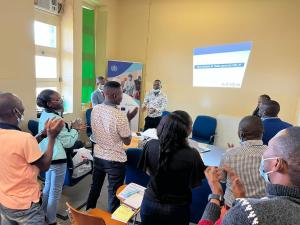Angola strengthens surveillance capacity in outbreak preparedness and response.
Mbanza-Congo, 3 June 2023: Over the past two years, Angola has seen significant improvements in the Health Information System, an essential mechanism for responding to public health emergencies and protecting the population. However, several challenges still need to be addressed in the epidemiological surveillance and epidemic response system, particularly regarding the capacity for case detection, notification, and investigation.
These shortcomings can jeopardize the readiness and preparedness to face outbreaks or events of public health importance, a situation recently evidenced during the emergence of the COVID-19 pandemic and other outbreaks and occurrences that continue to affect the country, with devastating consequences for the health and well-being of the population, such as measles and meningitis.
Therefore, to improve the system of data collection, analysis, investigation, and response to public health emergencies, the Ministry of Health, with the support of WHO, proceeded to revise and adapt the 3rd edition of the WHO/AFRO technical guidelines, a specialized instrument that provides a set of norms and standards on the implementation of the International Health Regulations (IHR 2005), and the due elaboration of a capacity building program for epidemiological surveillance professionals throughout the country.
As a follow-up, the Ministry of Health and WHO, with the financial support of the European Union, held a training from May 28 to June 2, 2023, in the city of Mbanza Congo, a capacity-building training on Integrated Disease Surveillance and Response (IDSR), for 14 epidemiological surveillance technicians from all municipalities of the province of Zaire.
According to Dr. Walter Firmino, WHO Emergency Officer, health technicians, particularly from municipalities, communities, and health facilities, considered as the frontline of surveillance, must be well equipped with knowledge and skills to identify cases, notify, investigate, and above all develop an appropriate response plan to address any outbreak and prevent the possibility of spreading to other communities, municipalities, or countries.
"This training is of fundamental importance in the outbreak and disease response system; therefore, the border provinces of Lunda Norte and Zaire were prioritized as a starting point to strengthen disease control at entry points and therefore ensure the country's ability to detect cases and respond immediately in case of epidemics in the communities."
During five days of training, the trainees learned about epidemic and pandemic preparedness in the WHO African Region; International Health Regulations (IHR); Identifying or Detecting Cases; 4) Notifying priority diseases and events; Data Analysis and Interpretation; Investigation of outbreak or public health events; and on Developing a Municipal Outbreak Preparedness and Response Plan.
Among the main conclusions and recommendations that emerged from the event, the participants defined as a priority for strengthening surveillance capacity in Zaire province, the training of technicians from state and private health units in epidemiological surveillance, monitoring of weekly information received from health units; ensuring the implementation of community surveillance in all municipalities in the province; regular development of feedback on the performance of the epidemiological surveillance system in the area, among others.
